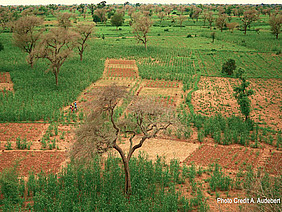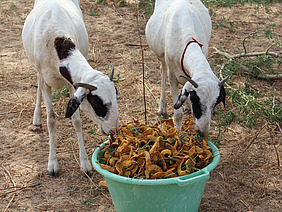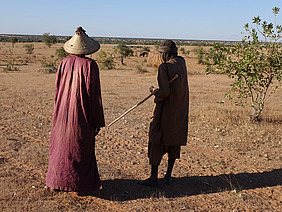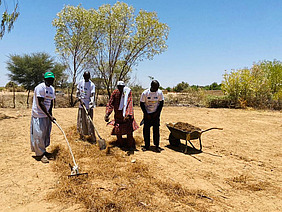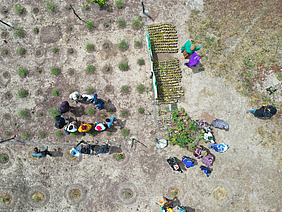(Frick, 29.09.2025) From 2020 to 2025, the EU-funded SustainSahel project supported smallholder farmers in the Sahel region, tackling land degradation and climate stress. Led by FiBL, the project demonstrated that agroecological practices are both effective and economically feasible. At seven pilot sites researchers and farmers worked hand in hand with institutions from Mali, Senegal, Burkina Faso, France, Germany, and Switzerland. More than 5000 farmers were involved representing thousands of hectares across different rainfall zones in the Sahel zone.
Farming practices with impact
Harun Cicek, project leader from the FiBL Department of International Cooperation, states: "We found that simple practices like mulching, composting, and integrating local trees and shrubs can boost yields by up to 40 percent. Furthermore, these measures improve soil and water management and provide fodder and medicinal resources."
Lead farmers are crucial to yield improvement
A highlight was the "lead farmer" model: Farmers trained in field schools passed their knowledge to 20 to 40 peers, creating a strong multiplier effect. Adoption of these practices led to yield increases of 150 to over 300 kilograms per hectare, translating to gains of up to 40 percent, and improved production stability even under climate stress.
Key recommendations for the future
At the closing workshop in May in Dakar, Senegal, concrete recommendations for stakeholders were compiled:
- For farmers: Adopt agroecological and organic farming. Necessary information and know-how can be found in the manuals and educational materials on the project website.
- For policymakers: Integrate agroecology into agricultural and environmental strategies; revise land codes to secure tree rights for farmers; invest in extension and supply chains; fund participatory research and transition support.
- For researchers: Deepen knowledge of tree-crop interactions, soil-water dynamics, and carbon storage; strengthen monitoring by using drones and satellite data; study adoption barriers and socio-economic impacts.
Agroecology is the future for Africa
In May 2025, SustainSahel led the organization for a large-scale collaborative conference titled "Agroecological transition of food systems in Africa." Together with eight other EU-Africa projects they provided compelling evidence: organic and agroecological farming are proven, scalable solutions for a sustainable African future.
Further information
Contact
- Harun Cicek, FiBL, Deputy Leader Group Agroecosystem Innovation & Adoption
- Gian Nicolay, FiBL, Department of International Cooperation, Group Policy & Sector Development
Links
- sustainsahel.net: Sustain Sahel project website
- sustainsahel.net: Final recommendations to farmers
- sustainsahel.net: Final recommendations to policy makers
- sustainsahel.net: Final recommendations to researchers
- sustainsahel.net: Manuals and educational materials
- conference.sustainsahel.net: Conference briefing "Agroecological transition of food systems in Africa"
Videos
- youtube.com: Sustain Sahel YouTube channel
- youtube.com: Conference video "Agroecology is the future for Africa"
Supporters
This project has received funding from the European Union's Horizon 2020 sustainable food security programme.
Partners
- Access Agriculture (AA), Benin
- African Forum for Agricultural Advisory Services (AFAAS), Burkina Faso
- Association of Professional Farmer Organisations (AOPP), Mali
- Agricultural Research Centre for International Development (CIRAD), France
- The Peasant Confederation of Faso (CPF), Burkina Faso
- Ecological Monitoring Centre (CSE), Senegal
- National Council for Consultation and Rural Cooperation (CNCR), Senegal
- Institute of Environment and Agricultural Research (INERA), Burkina Faso
- Institute of Rural Economy (IER), Mali
- International Institute of Tropical Agriculture (IITA), Kenya
- Rural Polytechnic Institute (IPR/IFRA), Mali
- Senegalese Institute of Agricultural Research (ISRA), Senegal
- National Research Institute for Sustainable Development (IRD), France
- Nazi BONI University (UNB), Burkina Faso
- University of Hohenheim, Germany
- University of Kassel, Germany




